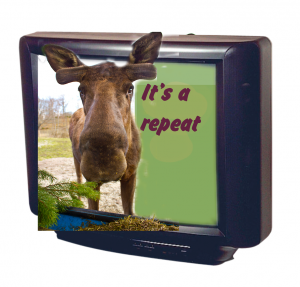Swedish broadcasters revised their schedules to accommodate global warming this week, bringing forward one of the country’s most popular and successful programmes, now going out a week early. Thousands of Swedes are glued to their televisions at this time of year, watching the country’s elk population migrate to summer grazing grounds. This natural event has been the runaway broadcasting success of the decade, celebrating six years of compulsive viewing… Here is a link to BBC coverage of the phenomenon, which is significant for public service broadcasters. Just try scheduling an ad break and you’ll see what I mean.

After watching a fully grown elk cross a swollen river, then defy gravity by hauling its long-legged body on to a sheet of melting ice in the shallows, it is clear that commercial TV cannot compete with nature, which has been doing this for millennia.
The scenario is surreal, with more than a dash of irony. Mass migrations occur around the planet, and, as far as we can tell, they go back for centuries, if not millennia. For a species to migrate and arrive intact requires collective recognition of a set of conditions that have been present at the start of countless earlier migrations. As the Swedish outside broadcasters will tell you, this year the elks are moving early. The chances are that we may never know what was different this year, but the elks have clocked it. At a species level, elks and humans will respond to signal carriers such as barometric pressure or temperature. It is highly unlikely that we will ever have words for more than a tiny percentage of planetary cycles, but we should not stop looking.

Leave a Reply